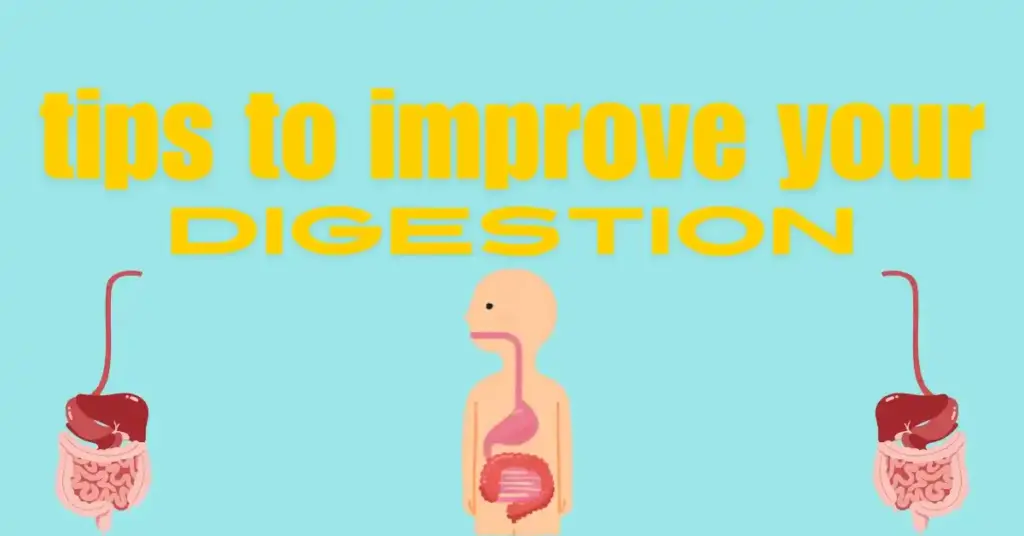Introduction
Ever felt like your stomach was doing somersaults after a meal? Or maybe you’ve experienced that uncomfortable bloated feeling that makes you want to unbutton your pants? If so, you’re not alone. Digestive problems are quite frequent, impacting millions of individuals globally. But here’s the good news: there are plenty of natural ways to improve your digestion right at home!
Good digestion is like a well-oiled machine – when it’s working smoothly, you hardly notice it. But when things go awry, boy oh boy, does it make its presence known! From heartburn and indigestion to bloating and constipation, digestive problems can really put a damper on your day.
But why should we care about improving our digestion naturally? Well, for starters, it’s a gentler approach that works with your body rather than against it. Plus, these natural methods often come with bonus health benefits beyond just better digestion. So, are you ready to give your gut some TLC? Let’s dive in!
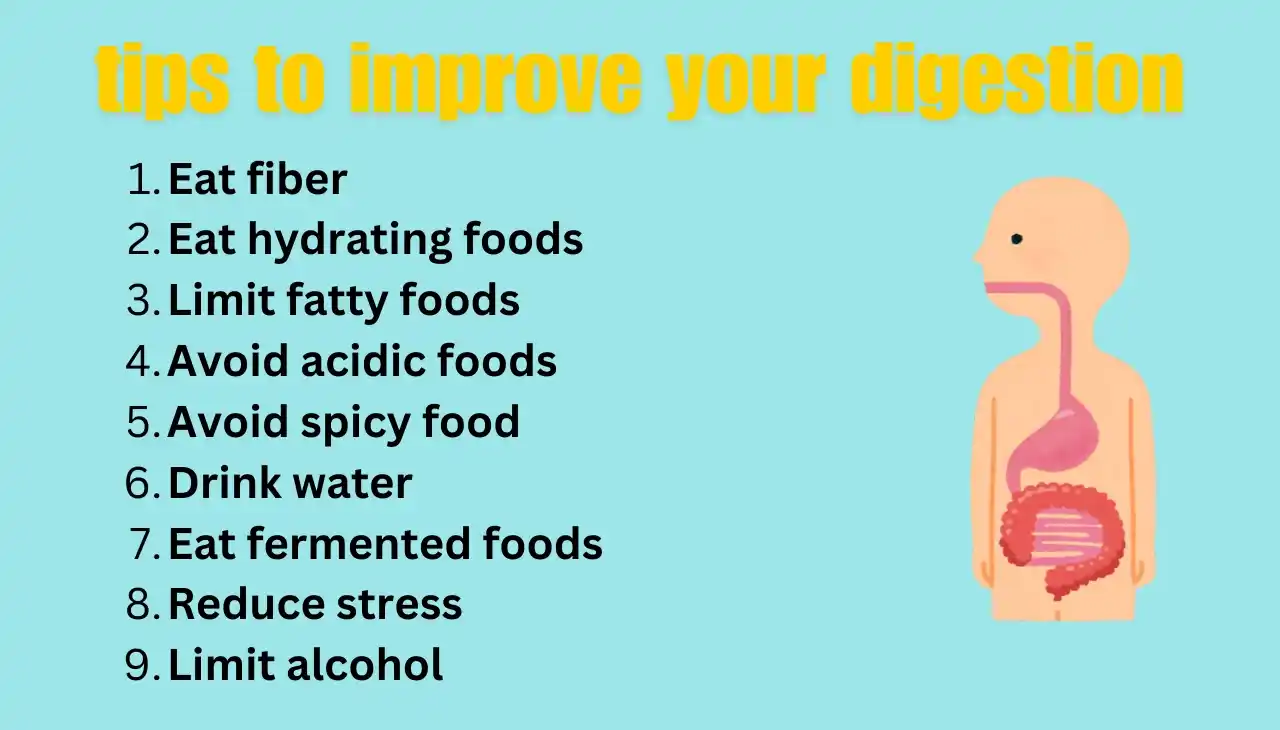
What is digestive health
Digestive health refers to the well-being of your digestive system, which includes your stomach, intestines, and associated organs. A healthy digestive system effectively digests food, absorbs nutrients, and removes waste. Factors like diet, hydration, stress management, and gut microbiome play a crucial role in maintaining good digestive health. If you experience symptoms like an upset stomach, bloating, or changes in weight, it’s essential to pay attention to your gut health and make informed choices to support it!
How to improve your digestion fast
Improving digestion naturally involves several lifestyle changes. Here are some effective tips:
- Eat Whole Foods: Choose minimally processed, nutrient-rich meals. Processed meals heavy in refined carbohydrates and chemicals can harm gut health.
- Get Plenty of Fiber: Fiber provides bulk to stools and promotes bowel movement. Include whole grains, leafy greens, and fresh fruits in your diet.
- Stay Hydrated: Drinking adequate water promotes intestinal health.
- Exercise Regularly: Physical exercise stimulates digestive muscle contractions, which help in food breakdown and transit.
- Prioritize Sleep: Adequate rest promotes general health, including digestion.
- Manage Stress: High stress levels might affect digestion, so try relaxing techniques.
Remember, small changes can make a big difference!
What foods are good for digestion?
Improving digestion entails picking meals that promote intestinal health. Here are some excellent alternatives:
- Yogurt: Yogurt contains probiotics, which support healthy gut bacteria and assist digestion.
- Apples: Their pectin content promotes stool volume and motility through the digestive system.
- Fennel: Fennel’s fiber and antispasmodic qualities help with digestion and relieve bloating.
- Kefir: Like yogurt, kefir includes microorganisms that aid in lactose digestion and prevent bloating.
- Chia Seeds: They promote regular bowel motions because of their high fiber content.
- Kombucha: A fermented tea with probiotics that benefits gut health.
- Papaya: Contains enzymes (such as papain) that help digestion.
- Dark Green Vegetables: Fiber-rich and nutrient-packed for overall gut health.
- Salmon: Omega-3 fatty acids reduce inflammation and support digestion.
- Peppermint: Soothes the digestive tract and eases discomfort.
Remember that eating a balanced diet rich in fruits, vegetables, and fermented foods helps to maintain a healthy digestive tract!
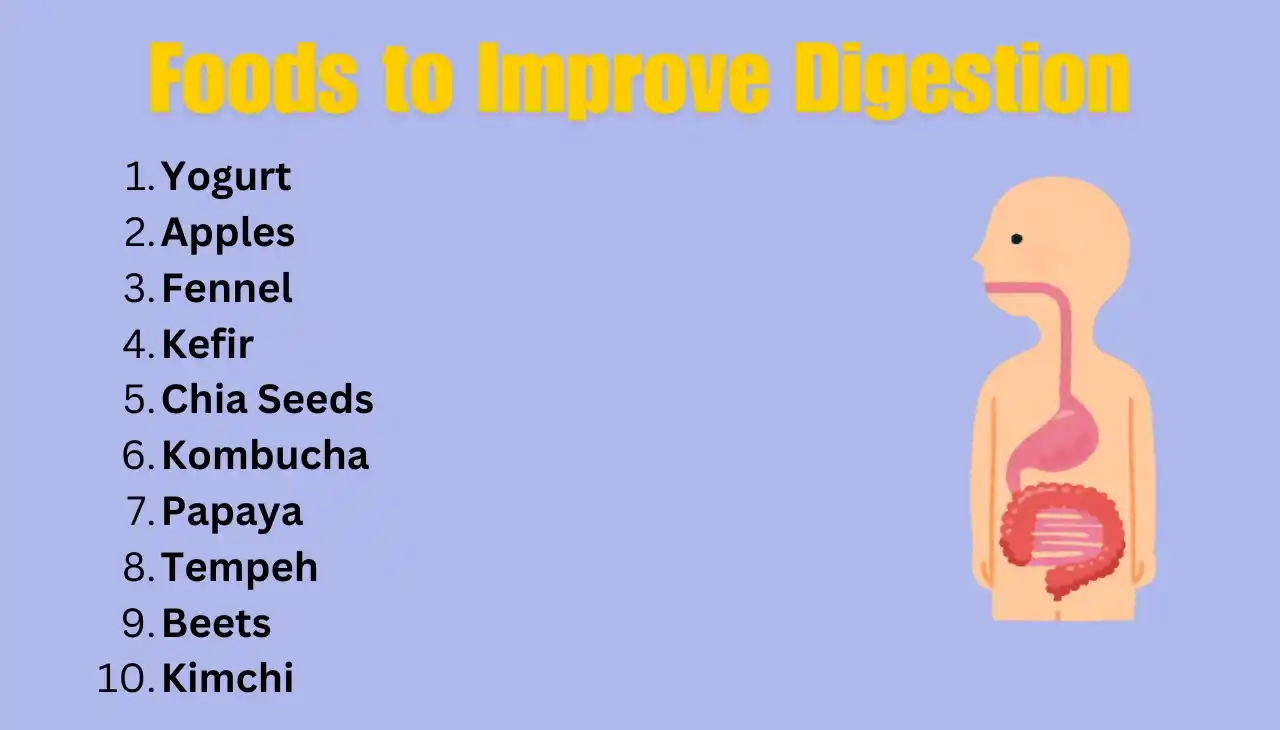
How to improve digestion naturally at home
A variety of lifestyle adjustments are required to improve digestion naturally. Here are some useful tips:
- Eat Whole Foods: Choose minimally processed, nutrient-rich meals. Processed meals heavy in refined carbohydrates and chemicals can harm gut health. Avoid meals that might irritate your digestive tract.
- Get Plenty of Fiber: Fiber provides bulk to stools and promotes bowel movement. Include whole grains, leafy greens, and fresh fruits in your diet.
- Stay Hydrated: Dehydration can impair digestion. Aim for 2-3 liters of pure, filtered water every day. Cucumbers, zucchini, pineapples, watermelons, tomatoes, and strawberries are all good hydration sources.
- Exercise Regularly: Physical exercise stimulates digestive muscle contractions, which help in food breakdown and transit. Aim for 30 minutes of walking or 11 minutes of home exercise every day.
- Manage Stress: High amounts of stress might impair digestion, so try relaxing techniques.
- Improve Your Posture: Proper posture when eating might assist digestion. Sit upright and prevent slouching.
- Sip on Ginger Tea: Ginger contains anti-inflammatory qualities that may benefit the digestive tract. Consume ginger tea throughout the day.
Remember, tiny adjustments may have a tremendous impact!
Symptoms of poor digestion
Poor digestion can occur in a variety of ways. Here are some frequent indications to look out for:
- Stomach Discomfort: Frequent gas, bloating, diarrhea, constipation, and abdominal discomfort may suggest irritable bowel syndrome (IBS), a condition affecting the large intestines.
- Fatigue: Imbalances in the gut microbiota have been associated with CFS. Nearly half of those who are fatigued also have IBS.
- Food Cravings: Excess sugar consumption may result in an excess of “bad” gut microorganisms. Balancing your microbiota might help you modify your eating patterns.
- Unintentional Weight Changes: Gut microbiomes differ between lean and obese persons. Diet helps to promote particular gut microorganisms.
Remember that a healthy gut contributes to overall well-being, so paying attention to these symptoms might help you achieve greater digestive health!
How to improve your digestion and bloating
There are various ways for improving digestion and minimizing bloating. Here are scientifically supported techniques to improve your digestive health:
- Identify the Cause of Bloating:
- Understand possible causes such as specific foods (e.g., fiber, sugar alcohols, FODMAPs), dietary intolerances (lactose or fructose), swallowing too much air, gut microbiota imbalances, or underlying health issues (IBS, IBD, endometriosis).
- Limit Foods and Activities:
- Avoid foods that frequently induce bloating, such as carbonated beverages, high-fiber meals, and sweets.
- Be careful of behaviors such as drinking via a straw, chewing gum, and eating huge meals.
- Stay Active:
- Regular exercise, such as brisk walks, helps to enhance bowel function, decrease bloating, and remove waste.
Remember that little modifications might result in major gains in your digestive comfort!
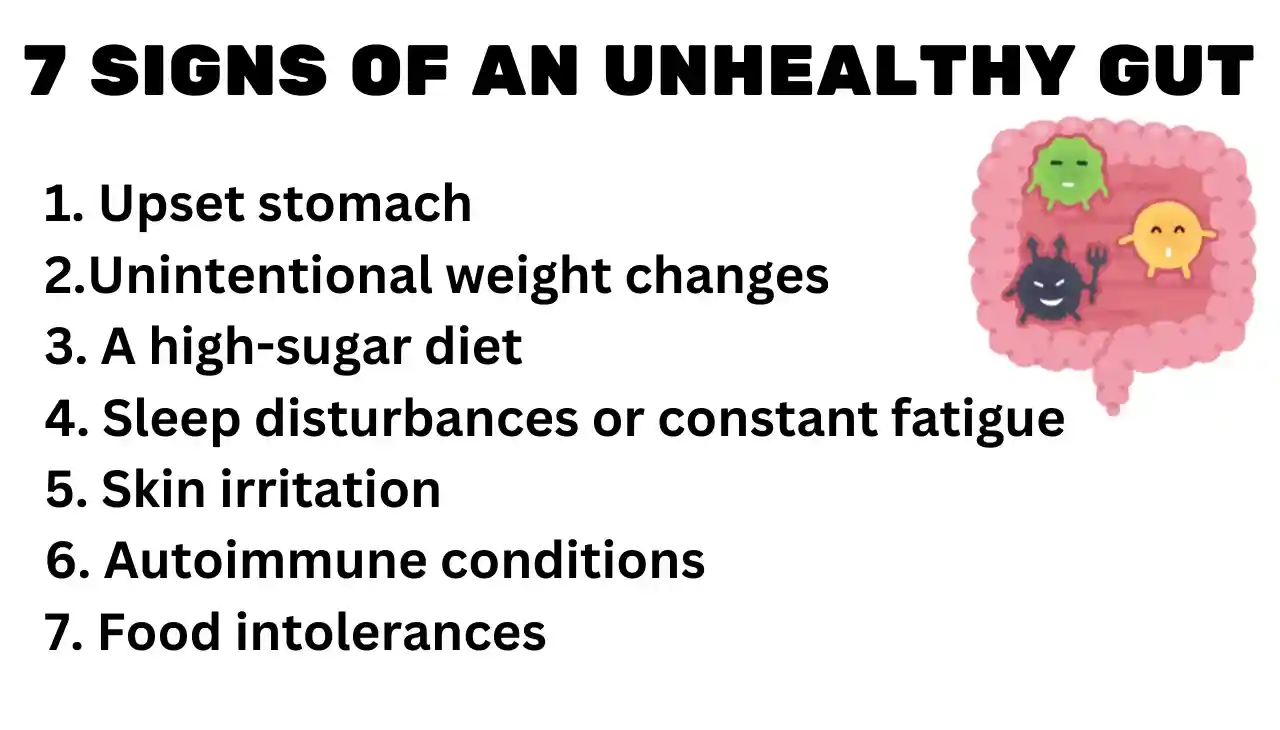
What to drink after eating to aid digestion.
After a meal, consider these beverages to improve digestion and support gut health:
- Warm Water: It can soothe your digestive tract and may aid gut bacteria.
- Herbal Teas: Teas including peppermint, turmeric, ginger, and fennel alleviate inflammation and digestive pain.
- Prune Juice: High in fiber, it encourages bowel movements.
- Green Juice or Smoothies: These fiber-rich hydration choices help waste go through your system more easily.
- Kombucha: Rich in probiotics, it supports nutrient absorption.
- Kefir: Another probiotic-rich fermented beverage with essential nutrients.
Avoid excessive alcohol or carbonated beverages, which might impair digestion. Also, if you are lactose sensitive, avoid cow’s milk-based drinks. Cheers for improved digestion!
How to improve digestion with ayurveda
Ayurveda provides practical ways for improving digestion and strengthening the agni (digestive fire). Here are a few tips:
- Hot Water with Lemon:
- Begin the day with 1.5 cups of warm water and 1 teaspoon lemon juice. This stimulates your digestive fire and supports good elimination.
- Throughout the day, drink hot water to help bowel motions.
- Raw Fennel Seeds:
- After each meal, chew a teaspoon of raw or gently toasted fennel seeds.
- Fennel seeds relieve stomach pain, cramps, heartburn, bloating, and gas.
- CCF Tea (Cumin, Coriander, Fennel):
- Mix equal portions cumin, coriander, and fennel seeds.
- Simmer one teaspoon of this mixture in a cup of water for 5 to 10 minutes.
- Drink this tea to relieve indigestion, discomfort, and gradually cleanse your body.
Remember that these Ayurvedic techniques can improve your digestive health!
What helps digestion after eating
Improving digestion after eating involves simple yet effective strategies. Here are some tips:
- Eat Whole Foods: Choose minimally processed, nutrient-rich meals. Processed meals can destabilize gut health and raise the risk of digestive problems.
- Get Plenty of Fiber: Fiber-rich foods (fruits, vegetables, legumes, and whole grains) aid in digestion, avoid constipation, and promote gut flora.
- Stay Hydrated: Drinking water helps digestion. Warm water with lemon might help to ease the digestive tract.
- Avoid Lying Down: Avoid laying down or falling asleep just after a meal. Gravity facilitates food passage via the digestive tract.
- Light Exercise: A post-meal stroll can help digestion.
- Consider Probiotics: Probiotics promote gut health and digestion.
Remember, tiny adjustments may have a tremendous impact!
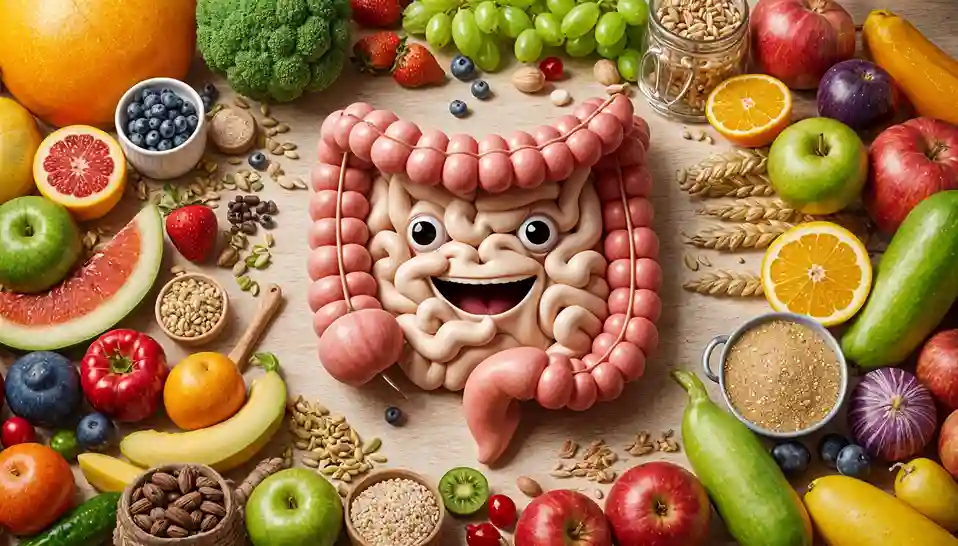
Medicine to improve digestion
Improving digestion frequently requires lifestyle modifications, but there are other drugs that can assist. Here are a few choices:
- Antacids: These over-the-counter drugs neutralize stomach acid, relieving heartburn and indigestion.
- H2 Blockers (H2 Antagonists): These decrease acid production in the stomach. Examples are famotidine and cimetidine.
- Proton Pump Inhibitors (PPIs): PPIs, such as omeprazole, reduce acid production more efficiently. They can be prescribed to treat illnesses such as gastroesophageal reflux disease (GERD).
- Antibiotics: In rare circumstances, antibiotics may be used to treat bacterial overgrowth in the stomach.
Remember to see a doctor before taking any drug. Additionally, lifestyle adjustments such as eating nutritious meals, staying hydrated, and controlling stress are critical to maintaining good digestion.
Improve your digestion in old age
Maintaining proper digestion becomes increasingly important as we become older. Here are some practical strategies to improve your digestive health:
- Stay Hydrated: Drinking water is important as you age since your thirst mechanism may be reduced. Aim for one-third of your weight in fluids every day (50 ounces for a 150-pound individual). Water-rich meals such as cucumbers, melons, and soups are also beneficial.
- Watch Your Diet:
- Add Fiber: Add fresh veggies, fruits, and healthy grains. Fiber helps to reduce constipation and promotes gut health.
- Reduce Salt: Consuming too much salt might have an influence on digestion, so use caution.
- Chew Thoroughly: Take your time when eating. Proper chewing improves digestion and nutrition absorption.
- Stay Active: Regular exercise helps proper digestion and general health.
- Relieve Stress: Chronic stress impairs digestion. Use relaxation techniques like yoga, hot yoga meditation, or deep breathing.
Remember that even tiny modifications can help you keep a healthy digestive system!
Tips to improve digestion
Choosing Whole Foods for Good Digestive Health
- Whole foods, like fruits, vegetables, whole grains, and lean proteins, are nutrient-rich and easy to digest.
- Processed foods, often containing artificial additives, preservatives, and other ingredients, can disrupt digestion.
Fractions of Fiber in Digestive System
- Soluble fiber, found in oats, beans, apples, and citrus fruits, softens stools and can lower cholesterol.
- Insoluble fiber, found in whole grains, nuts, and vegetables, bulks up stools and prevents constipation.
Healthy Fats for Good Digestive Function
- Healthy fats, especially omega-3 fatty acids, are crucial for good digestion.
- Fatty fish, walnuts, flaxseeds, and chia seeds are rich sources of these digestive superstars.
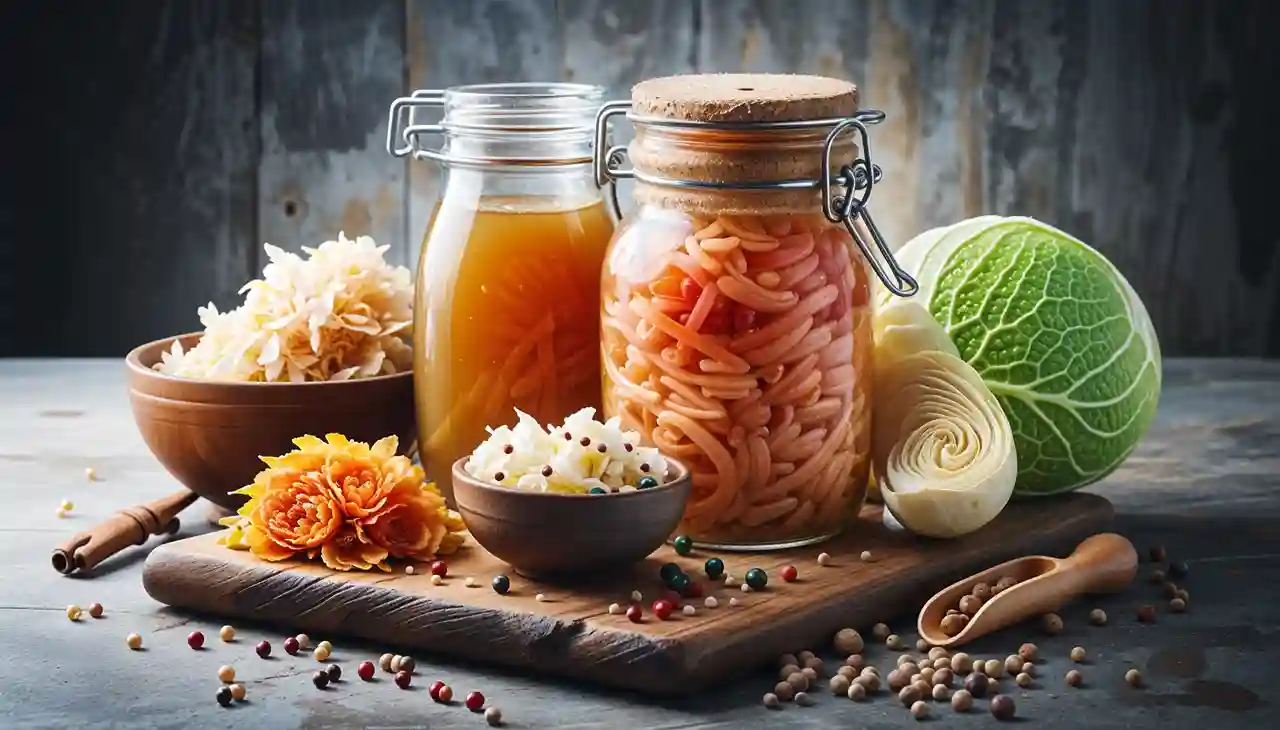
Drinking Water: The Ultimate Digestive Aid
- Water is the most underrated digestive aid, aiding in food breakdown, nutrient absorption, and intestine movement.
- The “8 glasses a day” norm is a decent beginning point, but individual requirements differ.
- Drink enough so urine is pale yellow, dark yellow indicates need for more water.
- Drinking water 30 minutes before meals is a good pre-meal preparation.
Managing Stress and Gut-Brain Connection
- Stress can disrupt digestion, leading to issues like indigestion, diarrhea, or constipation.
- Stress-Busting Techniques for Better Digestion:
- Deep breathing: Focus on your breath daily to pause stress.
- Meditation: A mini-vacation for the mind, lasting 5-10 minutes daily.
- Exercise: Engage in physical exercise to relieve stress.
- Yoga: Combines exercise and mindfulness benefits for stress relief.
- Stress management benefits both the mind and the gut.
Mindful Eating Practices
- Slow down and savor: Mindful eating involves slowing down and experiencing food thoroughly.
- Chewing: This method aids digestion by breaking down food into smaller pieces and mixing it with saliva.
- Chewing: Challenge yourself to chew each bite at least 20 times before swallowing.
- The goal is to prevent overeating and improve overall health.
Regular Exercise Benefits for Digestive System
- Exercise stimulates natural contraction of intestinal muscles, enhancing food movement through the digestive system.
- Walking, yoga, and core exercises are particularly beneficial for digestion.
- Even 20-30 minutes of moderate activity can significantly improve digestion.
- Regular exercise provides a gentle massage from the inside out, supporting healthy digestion.
Incorporating Gut-Supporting Nutrients
Probiotics:
- Friendly gut bacteria found in fermented foods like yogurt, kefir, sauerkraut, and kimchi.
- Help maintain gut balance and defense systems.
Glutamine:
- Superfood for gut lining cells, crucial for digestion and overall health.
- Sources include bone broth, grass-fed beef, chicken, fish, eggs, cabbage, spinach, and parsley.
Zinc:
- Digestive minerals essential for smooth digestive processes.
- Found in oysters, beef, pumpkin seeds, and lentils.
Lifestyle Considerations for Digestive Health
- Listen to Your Body’s Cues: Understand your body’s signals to adjust your diet.
- Impact of Habits on Digestion: Smoking can increase acid reflux and risk of stomach ulcers.
- Excessive Alcohol: It can irritate stomach lining and interfere with nutrient absorption.
- Late-night Eating: It can lead to indigestion and poor sleep.
- Sustainable Changes for Long-Term Health: Improving digestion is about long-term, sustainable changes. Start small, like adding water to your day or mindfully eating one meal. Over time, these small changes can lead to significant improvements in digestive health.
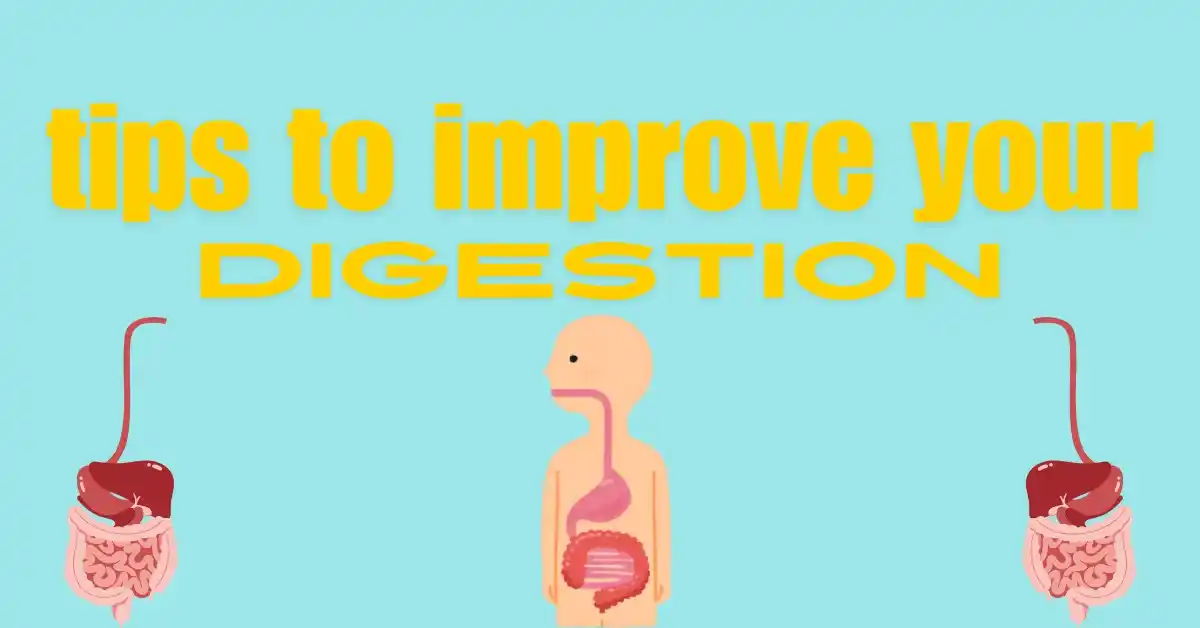
Conclusion
There you have it, folks – a comprehensive guide to improving your digestion naturally at home. From eating whole foods and staying hydrated to managing stress and incorporating gut-supporting nutrients, there are plenty of ways to show your digestive system some love.
Remember, good digestion is the foundation of overall health. When your digestive system is happy, you’re more likely to feel energetic, healthy, and ready to take on the world!
So why not start today? Choose one or two of these techniques and try them. Your gut will thank you, and who knows – you might just find yourself feeling better than ever!
Here’s to happy, healthy digestion – your ticket to feeling great from the inside out!
FAQs:
Can improving my digestion really impact my overall health?
Absolutely! Your digestive system is vital to your overall health. It's not just about avoiding uncomfortable symptoms like bloating or constipation. Good digestion ensures that your body can effectively absorb nutrients from food, which is essential for everything from energy levels to immune function. Plus, there's growing evidence of a strong gut-brain connection, meaning that a healthy gut can contribute to better mental health too. So by improving your digestion, you're really giving your whole body a boost!
I've heard conflicting advice about drinking water with meals. Should I avoid it?
This is a common question, and there's no one-size-fits-all answer. Some people find that drinking water with meals dilutes their stomach acid and can slow digestion. However, staying hydrated is crucial for good digestion overall. A good compromise is to drink a glass of water about 30 minutes before your meal, and then sip small amounts during the meal if needed. This way, you're hydrated for the digestive process without potentially diluting stomach acids. As always, listen to your body – if you notice any discomfort, adjust your habits accordingly.
Are there any specific foods I should avoid for better digestion?
Common digestive issues include highly processed foods, dairy products, spicy foods, artificial sweeteners, and fried foods. These foods lack fiber and contain additives that can irritate the gut, cause bloating and gas, and are high in fat. For those with lactose intolerant conditions, dairy products are suitable. However, these aren't universal rules. To identify personal trigger foods, keep a food diary and note patterns between eating and feeling.
How long does it typically take to see improvements in digestion after implementing these strategies?
The timeline for improvement in digestive issues varies depending on the individual and the specific changes made. Some may see a difference in just a few days, while others may take weeks for more comprehensive changes like diet overhauls or stress-management techniques. It's important to be patient and consistent with changes, as the body needs time to adjust. If improvements don't occur after several weeks or if digestive issues are severe, consulting a healthcare professional is recommended.
Can stress really affect my digestion that much? It seems unrelated.
Stress can significantly impact digestion due to the gut-brain axis, which connects the gut and brain. Stress can cause the body to go into "fight or flight" mode, slowing down or halting digestion. This can lead to symptoms like stomach aches, nausea, and changes in bowel habits. Chronic stress can lead to persistent digestive issues over time. Stress management techniques like meditation, deep breathing, and regular exercise can support digestive health. Taking deep breaths can calm the mind and give the gut a break during stress.
